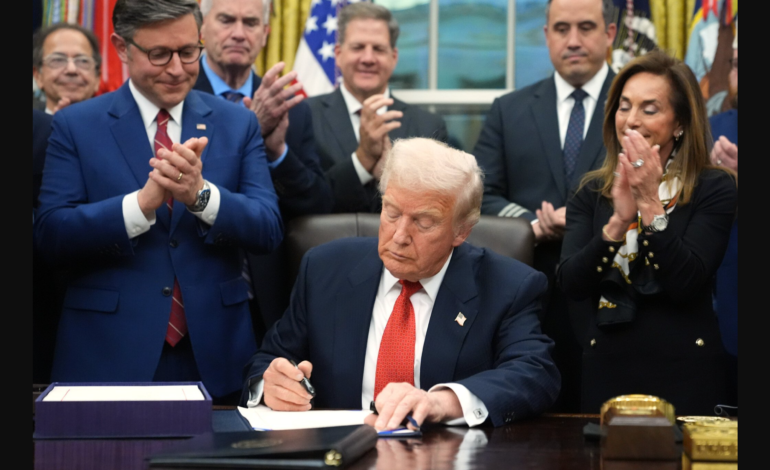
A deal to end the shutdown — but at what political cost?
By: Dr. Avi Verma
After forty-three exhausting days, a deal has finally reopened the United States government. Federal workers are back on the job, air traffic controllers have returned to full staffing, SNAP benefits have been restored, and millions of Americans dependent on federal services can breathe again. On the surface, this appears to be a moment of relief — and perhaps even a victory for stability.
But as we peel back the layers, one uncomfortable truth emerges: Democrats may have just paid a steep political price for that relief.
And the American public knows it.
The deal: A temporary fix with long-term consequences
The bipartisan agreement that ended the shutdown did not include the one protection Democrats insisted was non-negotiable — a guarantee against skyrocketing health-care premiums triggered by Trump-era sabotage of the Affordable Care Act marketplaces.
For weeks, House and Senate Democrats argued that the shutdown should be resolved only alongside measures to shield families from catastrophic increases in insurance costs. That demand evaporated in the final hours of negotiation.
Many House Democrats refused to support the compromise for exactly this reason. Congressman Raja Krishnamoorthi was one of the voices warning that the deal “fails the basic test of protecting Americans’ health care.” Others echoed this sentiment, calling the agreement a surrender to Republican pressure.
Public opinion: Relief mixed with deep frustration
Across the country, polling and early reactions show a contradictory mood.
On one hand, Americans are relieved — deeply relieved — that the shutdown is over. Travel delays, federal court disruptions, SNAP anxiety, and national security concerns had reached breaking points.
On the other hand, a growing share of voters is expressing frustration that Democrats “caved in” without securing health-care protections.
After a week of strong Democratic wins in off-year elections, many supporters expected more backbone, not less.
Among independents, the sentiment is particularly sharp: they view Congress — not just Republicans — as having failed to stand firm for ordinary Americans.
Did Democrats commit political suicide?
“Suicide” may be too strong a word, but there is no denying that Democrats lost significant leverage in the negotiation. Timing is everything in politics, and Democrats entered these talks after a strong week—having won key governorships and state legislative races, energized suburban voters, and built national momentum heading into 2026. Yet, when faced with an exhausted public desperate to end the shutdown, many Democrats chose détente over confrontation. Strategically, this may have spared the country further pain, but it came at a political cost.
By stepping back, Democrats weakened their negotiating position for future budget battles, disappointed progressive activists, and gave Republicans an opening to declare victory. In a hyper-polarized environment where perception often outweighs reality, many within the party feel outmaneuvered. The choice to prioritize ending the shutdown over leveraging political momentum has left Democrats with a short-term solution but long-term questions about their strategic positioning heading into the midterms.
Who benefits politically?
The question of who gains politically from the shutdown deal is currently dominating Washington discourse. In the short term, Republicans may claim a narrative edge, arguing that Democrats blinked first, that the GOP held firm on fiscal demands, and that the shutdown ultimately ended on their terms. This allows Republicans to present themselves as disciplined and unwavering, at least in the immediate public eye.
However, the long-term outlook is far less certain. Voters rarely forget the hardships caused by a 43-day government shutdown, and public sentiment continues to largely hold Republicans responsible for the impasse. Most polls indicate that a majority blame the GOP, only a small minority blame Democrats, and independent voters overwhelmingly view the shutdown as a Republican-created crisis. If health-care premiums rise in the coming year, as economists predict, Republicans are likely to face the political fallout. Additionally, internal GOP divisions exposed during the shutdown have left lasting fractures in their coalition, undermining claims of a decisive political victory.
What about the midterms?
Had the shutdown extended for another month, the political consequences for the GOP in the midterms could have been catastrophic. By ending it now, Republicans may have avoided total collapse, but they have not secured a definitive win. Democrats gain from voters’ approval of restored government services, the popular reinstatement of SNAP benefits, and independent voters’ continued distrust of GOP extremism.
Meanwhile, Republicans can still claim a measure of fiscal discipline and argue that Democrats surrendered their leverage on health-care protections. Ultimately, this deal alone will not determine the outcome of the midterms. The post-shutdown narrative will be decisive: if Democrats successfully frame the GOP as the party responsible for a 43-day shutdown that endangered federal workers and failed to protect families from soaring health-care premiums, they can maintain a political advantage. If Democrats fail to control the narrative, Republicans will seize the opportunity to fill the void.
The one clear positive
The government is open again, and federal workers are finally being paid. SNAP benefits have been restored, air traffic operations are stabilizing, and national parks, courts, and essential public services are back on track. For millions of American families, these immediate fixes matter far more than any party’s political maneuvering.
Final word
This deal ends the shutdown — but it does not end the debate. And for Democrats, it forces a moment of deep introspection: will they continue to rely on defensive, risk-averse politics, or will they finally confront the GOP’s manufactured crises with a unified and unapologetic resolve? The American public is watching. History is still being written.